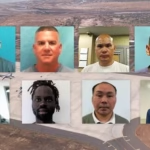The Trump administration has taken another step in dismantling the special humanitarian parole program known as CHNV, which was designed for nationals of Cuba, Haiti, Nicaragua, and Venezuela.
In a statement released on June 6, 2025, the United States Citizenship and Immigration Services (USCIS) announced it intends to resume the process of revoking the legal status of CHNV beneficiaries after the U.S. Supreme Court lifted a preliminary injunction that had so far blocked the termination of the program.
“On May 30, 2025, the Supreme Court of the United States issued an order lifting the preliminary injunction issued on April 14, 2025, by the U.S. District Court for the District of Massachusetts,” USCIS stated. The injunction had suspended parts of a Federal Register notice published on March 25, 2025, titled “Termination of Parole Process for Cubans, Haitians, Nicaraguans, and Venezuelans (CHNV)”.
The legal case is part of Noem v. Svitlana Doe, 605 U.S. ___ (2025), a high-profile lawsuit in which several conservative states challenged the Biden administration — still in power at the time of the program’s launch — over the legality of this humanitarian mechanism.
“With this decision, the Department of Homeland Security (DHS) is now authorized to terminate the parole status granted under the CHNV program,” USCIS explained. The agency added that this also includes “the revocation of any work authorization issued based on that parole status.”
In other words, CHNV beneficiaries — many of whom came to escape unstable regimes or dire economic conditions — now risk not only losing their temporary stay rights but also their legal ability to work in the United States.
USCIS specified that affected individuals will receive an official notice: “Foreign nationals whose parole is terminated and whose work authorization is revoked will receive a notification in their myUSCIS account.”
This announcement comes amid a broader tightening of immigration policies under the Trump administration, recently returned to power. The CHNV program, praised by its advocates as a humane and orderly alternative to irregular migration, is now on the verge of being fully dismantled.
Migrant advocacy organizations are already condemning the decision as one with dire consequences. Several legal appeals may be considered in the coming weeks, but the judicial path appears increasingly uncertain.
More than 520,000 individuals from the four countries — including over 320,000 Haitians — had benefited from the humanitarian parole. The vast majority, between 80 and 90%, have already adjusted their status thanks to the Biden administration’s decision to grant TPS (Temporary Protected Status) to Haiti in July 2024. However, many beneficiaries did not apply for a work permit under TPS because they already held a valid work card under the CHNV program. Some of those who did apply for a new work permit have still not received the document.







